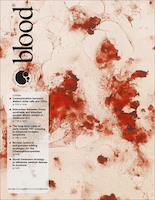
BLOOD
Scope & Guideline
Exploring the Depths of Blood Science.
Introduction
Aims and Scopes
- Hematologic Malignancies:
A core focus of the journal is on hematologic cancers such as leukemia, lymphoma, and myeloma, including studies on their molecular mechanisms, therapeutic strategies, and clinical outcomes. - Transfusion Medicine and Hemostasis:
Research related to blood transfusion practices, coagulation disorders, and the management of bleeding disorders is prominently featured, emphasizing both clinical and laboratory aspects. - Genomics and Precision Medicine:
The journal publishes studies on the genetic basis of blood disorders and the application of genomic technologies to personalize treatment approaches. - Immunotherapy and Novel Therapeutics:
There is a significant focus on immunotherapeutic strategies, including CAR T-cell therapies and monoclonal antibodies, aimed at treating various hematologic malignancies. - Patient-Centered Care and Quality of Life:
Research addressing the psychosocial aspects of hematologic diseases, including patient-reported outcomes and the impact of treatment on quality of life, is increasingly emphasized. - Clinical Trials and Real-World Evidence:
The journal highlights findings from clinical trials as well as real-world studies that provide insights into treatment effectiveness and safety in diverse populations.
Trending and Emerging
- CAR T-Cell Therapy:
There is a significant increase in research related to CAR T-cell therapies, including their development, efficacy, and management of associated toxicities, reflecting the growing importance of this treatment modality in hematologic malignancies. - Genetic and Molecular Profiling:
Studies focusing on genetic mutations, epigenetic changes, and their implications for disease progression and treatment response are becoming increasingly prevalent, emphasizing the role of precision medicine in hematology. - Real-World Evidence and Health Economics:
The journal is increasingly publishing articles that analyze real-world data to evaluate treatment outcomes and healthcare costs, highlighting the importance of pragmatic approaches in clinical decision-making. - Immunotherapy Combinations:
Emerging research on combining immunotherapies with other treatment modalities, such as targeted therapies and traditional chemotherapy, is gaining momentum, indicating a shift towards multi-faceted treatment strategies. - Patient-Centered Research:
An emphasis on patient-reported outcomes, quality of life assessments, and studies addressing the psychosocial aspects of hematologic diseases is becoming more pronounced, reflecting a holistic approach to patient care.
Declining or Waning
- Traditional Chemotherapy Approaches:
There is a declining emphasis on classical chemotherapy regimens for hematologic malignancies as newer targeted therapies and immunotherapies gain prominence. - Basic Hematology Research:
Research focused solely on basic hematology without immediate clinical application appears to be waning, as the journal increasingly prioritizes translational and clinical studies. - Epidemiological Studies:
While still relevant, the volume of purely epidemiological studies on blood disorders has decreased, with a shift towards more integrated approaches that combine clinical outcomes with genomic and molecular data. - Single-Agent Therapy Studies:
The focus on studies evaluating the efficacy of single-agent therapies has diminished, as combination therapies are recognized for their enhanced effectiveness in treating complex hematologic conditions. - Niche Hematologic Disorders:
Research on less common hematologic conditions may be receiving less attention in favor of more prevalent disorders and broader therapeutic strategies.
Similar Journals

Indian Journal of Hematology and Blood Transfusion
Fostering Collaboration in Hematology and Transfusion MedicineIndian Journal of Hematology and Blood Transfusion, published by SPRINGER INDIA, serves as a leading platform for disseminating original research, reviews, and case studies in the field of hematology. With an ISSN of 0971-4502 and E-ISSN 0974-0449, this journal has been instrumental in advancing knowledge from 2000 to 2024, providing insights into critical issues surrounding blood disorders and transfusion practices. Currently ranked in the Q3 category for Hematology for 2023, it reflects a commitment to high-quality scientific content amidst a competitive landscape where it ranks 97/137 in Scopus for Medicine - Hematology, placing it in the 29th percentile of its peers. The journal primarily addresses a diverse readership, including researchers, healthcare professionals, and students, aiming to foster innovation and collaboration within the field. Although it operates under a subscription model, access options for individual articles and institutional subscriptions ensure that valuable research is disseminated widely to enhance medical practice and education in hematology.

INTERNATIONAL JOURNAL OF HEMATOLOGY
Delivering Cutting-Edge Findings in HematologyThe INTERNATIONAL JOURNAL OF HEMATOLOGY, published by SPRINGER JAPAN KK, serves as a critical platform for advancing research in the field of hematology. With a prestigious history spanning over three decades from 1991 to 2024, this journal is recognized for its impactful contributions, evidenced by its Q2 category ranking in Hematology for 2023, and its notable position at rank #71 out of 137 in the Scopus Medicine Hematology category. Researchers and professionals within the hematology community benefit from the journal's rigorous peer-reviewed articles that cover a wide range of topics, including clinical studies, basic research, and novel therapeutic strategies. Though currently non-open access, it provides essential insights and findings to an audience passionate about the latest advancements in blood disorders and treatments. Situated in Japan, the journal not only showcases high-quality research but also fosters a global exchange of knowledge in hematology, making it a significant resource for scholars, practitioners, and students alike.
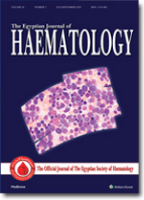
Egyptian Journal of Haematology
Shaping the Landscape of Hematology in the Middle EastThe Egyptian Journal of Haematology, published by WOLTERS KLUWER MEDKNOW PUBLICATIONS, stands as a pivotal resource in the field of hematology, particularly within the context of Egypt and the broader Middle Eastern region. This journal is dedicated to disseminating high-quality research that explores the latest advancements in blood disorders, hematologic malignancies, and transfusion medicine. With a focus on original research, case studies, and reviews, it aims to provide a comprehensive platform for hematologists, researchers, and healthcare professionals to enhance their understanding and management of hematological conditions. Although it is not an open-access journal, the rigorous peer-review process ensures that only the most impactful studies are published, contributing to the journal's reputation in the academic community. The Egyptian Journal of Haematology serves as an essential tool for advancing knowledge, improving clinical outcomes, and fostering collaboration among experts in the field.
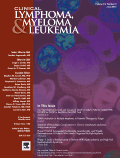
Clinical Lymphoma Myeloma & Leukemia
Pioneering Insights into Lymphoma, Myeloma, and LeukemiaClinical Lymphoma Myeloma & Leukemia is a prestigious journal dedicated to the study and treatment of hematologic malignancies, offering a vital platform for researchers and healthcare professionals in the fields of oncology, hematology, and cancer research. Published by CIG MEDIA GROUP, LP, this journal has established itself as a crucial resource since its inception in 2010, with a continuous commitment to disseminating knowledge until at least 2024. With an impact factor that objectively reflects its influence, it is rated in Q3 quartiles in both Cancer Research and Hematology as well as in Oncology as of 2023. Researchers can access a wealth of articles and studies that explore various dimensions of lymphoma, myeloma, and leukemia, thus fostering an environment of collaboration and innovation. Although it currently does not offer full open access, its extensive archive and rigorous peer-review process ensure the publication of high-quality research, making it an essential resource for anyone dedicated to advancing the science and practice of treating blood cancers.

Blood Research
Innovating Insights into Blood Disorders and TreatmentsBlood Research, published by SPRINGER, is a premier journal dedicated to the multifaceted realm of hematology, serving as a crucial platform for disseminating innovative research findings and advancements in the diagnosis and treatment of blood-related disorders. With an ISSN of 2287-979X and an E-ISSN of 2288-0011, this journal is recognized for its commitment to scholarly excellence and impact in the field, currently holding a reputable Q2 ranking in the Hematology category as per the 2023 metrics. The journal spans from 2013 to 2024, providing a broad archive of quality research that is vital for researchers, healthcare professionals, and students alike. Although it is not an Open Access journal, it offers insightful contributions that enhance the understanding of hematological science, fostering the exchange of knowledge crucial for advancing patient care and clinical practices globally. The journal’s performance is underscored by its Scopus ranking in the 46th percentile, reflecting its significant role in the ongoing discourse in hematology.
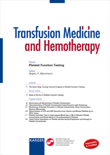
TRANSFUSION MEDICINE AND HEMOTHERAPY
Transforming patient care through cutting-edge research.TRANSFUSION MEDICINE AND HEMOTHERAPY, published by KARGER, is a prominent journal dedicated to advancing the fields of hematology and transfusion medicine. With an ISSN of 1660-3796 and E-ISSN 1660-3818, this esteemed journal has been a valuable resource for researchers and clinicians since its inception in 1973, with significant publication phases continuing into 2024. It currently holds a Q2 ranking in Hematology and a Q3 ranking in Immunology and Allergy, reflecting its impact and relevance in these critical fields. The journal features original articles, reviews, and clinical studies, presenting cutting-edge research that aids in the development of effective therapies and enhances patient care. Open access options are available, ensuring that crucial findings are accessible to a broad audience. As an important platform for dialogue and advancement in transfusion science, TRANSFUSION MEDICINE AND HEMOTHERAPY supports the global health community's efforts to improve treatment outcomes and foster innovation in medical practices.
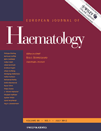
EUROPEAN JOURNAL OF HAEMATOLOGY
Bridging Science and Practice in Blood Disorder ManagementEUROPEAN JOURNAL OF HAEMATOLOGY, published by Wiley, serves as a vital resource for experts in the field of hematology, focusing on the latest advancements in blood disorders and therapies. With an ISSN of 0902-4441 and an E-ISSN of 1600-0609, this esteemed journal has been disseminating knowledge since 1986 and continues to thrive, converging its visionary approach through to 2024. Notably, it holds a distinguished Q2 ranking in Hematology and an impressive Q1 ranking in the broader category of Medicine (miscellaneous) as of 2023, highlighting its significant contribution to the scientific community. With a Scopus rank of #45/137 and a 67th percentile in the field, the journal is recognized for its rigorous peer-reviewed research, making it an indispensable publication for researchers, practitioners, and students aiming to stay at the forefront of hematological studies. Though not an open-access journal, it ensures broad accessibility to critical findings via its subscription model, thus fostering an informed and globally engaged audience.

UHOD-Uluslararasi Hematoloji-Onkoloji Dergisi
Illuminating the path to breakthroughs in blood health.UHOD-Uluslararasi Hematoloji-Onkoloji Dergisi, published by AKAD DOKTORLAR YAYINEVI, is a pivotal journal in the fields of hematology and oncology, catering to an international audience of researchers, clinicians, and students. Since its inception in 2005, the journal has committed to disseminating high-quality, peer-reviewed research, highlighting advancements and challenges in the diagnosis and treatment of hematological and oncological disorders. Registered under ISSN 1306-133X, it serves as a significant platform for scholarly discourse, despite its recent categorization in the Q4 quartile for both hematology and oncology—indicating opportunities for growth and contribution within the scientific community. While currently not Open Access, the journal's indexed contribution to Scopus ranks it within the 12th and 17th percentiles in the domains of hematology and oncology respectively, reflecting its emerging presence within the academic landscape. As it approaches its convergence point in 2024, UHOD strives to elevate its influence, providing invaluable insights and fostering collaborations in the ongoing fight against blood disorders and cancer.
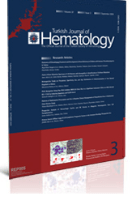
Turkish Journal of Hematology
Advancing hematological research for a healthier tomorrow.Turkish Journal of Hematology is an esteemed publication dedicated to advancing the field of hematology, producing influential research since its inception in 1999 under the auspices of GALENOS PUBL HOUSE. With an Open Access model, it facilitates widespread dissemination of knowledge, allowing researchers, clinicians, and students to stay abreast of the latest developments in blood disorders and treatments. With an ISSN of 1300-7777 and an E-ISSN of 1308-5263, the journal holds a commendable position in the academic community, evidenced by its 2023 Q3 ranking within the hematology category and its standing at #80 out of 137 in the Scopus database, placing it in the 41st percentile. Covering a wide scope of topics within hematology, this journal serves as a critical resource for disseminating innovative research and clinical practices pertinent to the ongoing challenges faced in this vital area of medicine. With its continuous publication until 2024, Turkish Journal of Hematology remains a beacon for enhancing the understanding and treatment of hematological conditions within the Turkish and global medical communities.
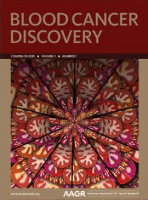
Blood Cancer Discovery
Illuminating the Path to Understanding Blood MalignanciesBlood Cancer Discovery is a premier academic journal published by the American Association for Cancer Research, dedicated to advancing the understanding of hematologic malignancies through cutting-edge research in the fields of oncology, biochemistry, and molecular biology. With an impressive impact factor and recognition as a Q1 journal across multiple disciplines, including cancer research and hematology, Blood Cancer Discovery serves as an essential platform for scholars and practitioners alike, facilitating impactful discourse and dissemination of pioneering findings. This open-access journal, established within the vibrant academic landscape of the United States, aims to bridge gaps in research and foster collaborations to ultimately enhance patient outcomes. Its Scopus rankings demonstrate its vital role in the critical advancement of cancer research and therapeutic development. By inviting contributions from a diverse range of disciplines, Blood Cancer Discovery is poised to drive innovation and inspire future advancements in understanding blood cancers.